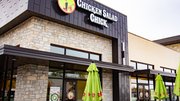Article
Why the full-service market is ripe for Dig Inn
While the price point and name of the full-service concept is still up in the air, Eskin said Dig Inn's mission of helping chefs learn to cook and exposing customers to local vegetables and farms, will drive the neighborhood joint opening in New York's West Village.

April 12, 2019 by Cherryh Cansler — Editor, FastCasual.com
While full-service brands and QSRs have been trying for the past decade to give off a more fast casual vibe, Dig Inn is branching out in the opposite direction. Although the 26-unit fast casual chain founded by Adam Eskin in 2011, is still thriving, it's jumping into the full-service game, thanks to a $15 million investment from Enlightened Hospitality Investments — the growth equity fund from Danny Meyer's Union Square Hospitality Group.
"We have spent 7+ years honing in on what we're good at: building our agricultural platform (~80 farms + our own), executing against multiple revenue streams, cooking and culinary training in scale and hiring the right talent at the support level," Eskin said in an interview with FastCasual. "Our model is far more complicated than our peers, but this complexity makes us even more defensible and scalable over time. Because of that, we feel strongly that we can move into multiple service restaurant formats expanding our delivery-specific cooking and operating models, distributing produce to other restaurants, retailing from our own farming operation and more."
at: building our agricultural platform (~80 farms + our own), executing against multiple revenue streams, cooking and culinary training in scale and hiring the right talent at the support level," Eskin said in an interview with FastCasual. "Our model is far more complicated than our peers, but this complexity makes us even more defensible and scalable over time. Because of that, we feel strongly that we can move into multiple service restaurant formats expanding our delivery-specific cooking and operating models, distributing produce to other restaurants, retailing from our own farming operation and more."
While the price point and name of the full-service concept is still up in the air, Eskin said Dig Inn's mission of helping chefs learn to cook and exposing customers to local vegetables and farms, will drive the neighborhood joint opening in New York's West Village.
"Fast casual is a very high-volume industry so our chefs can be extremely busy," he said. "We still want to create an environment where our team can grow and learn new culinary skills. It's important to note that Dig Inn isn't just trying to create a fast casual chain, we're trying to rebuild the food system through vegetables, education, and supporting local farmers. This new concept will be a new way for people to interact with the food on their plate."
In an open letter published this week on Dig Inn's website, Eskin pointed out that the company today is very different from when it started 10 years ago.
"We've changed everything from our name to our menu, to our strategy for designing, building and operating our restaurants," he wrote. "Sometimes I wonder if we've been willing to try and fail too much, but it's this relentless experimentation that has gotten us to where we are today."
That experimentation has paid off; Meyer's group not only brings capital to the table but a best-in-class culture of hospitality and cooking, Eskin said in the letter.
"Their unrelenting focus on their people and their values couldn't be more aligned with our long-term vision for rebuilding the food system and changing the way we eat," he wrote.
The feeling is,apparenlty, mutual.
"Dig Inn is working to bring unprecedented and lasting change to our food system, and we're proud to partner with them on their journey," Meyer told Eskin.
What now?
The funding — along with the previously raised $56 million — will go toward not only developing the full-service concept but toward a variety of other goals, including opening 10 Dig Inn units this year.
"We're focused on our people, food and farms in the northeast, so we'll be keeping it local in '19," Eskin said.
The chain is also expanding its delivery service, Room Service, and customers should look for a different type of cooking.
"Same ethos, same people, same vegetables — but a menu specifically designed for food that travels," he said.
Another of Eskin's goals is to hire up to 300 chefs, many of whom have never stepped foot in a restaurant kitchen. The team will teach them that knife skills are life skills and how learning how to cook can change everything.
Lastly, the chain is on track to supply its restaurants with more than 8 million pounds of vegetables, including 100,000 pounds from its own farmer, Larry Tse, and his newly launched Young Farmer Incubator Program.
"As we've grown and evolved, there are some things that have remained the same: our values, our passion, and our collective belief that access to good food — picked recently enough to enjoy its full set of nutrients, carried only as far as it needs to, grown and cooked by first names, and priced to feed a neighborhood — shouldn't have to be a movement, an ethos, a privilege, or even a doubt," Eskin said.
 ChatGPT
ChatGPT Grok
Grok Perplexity
Perplexity Claude
Claude












